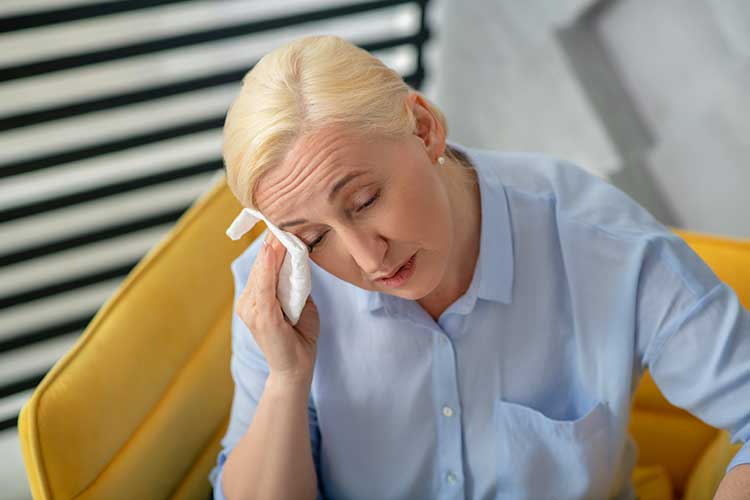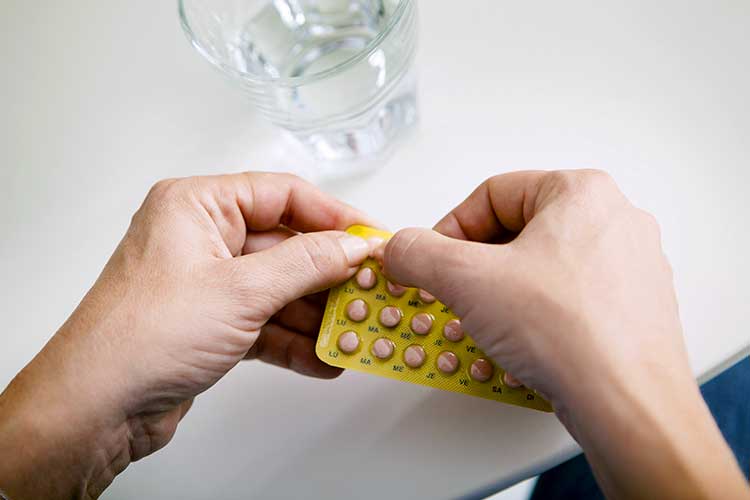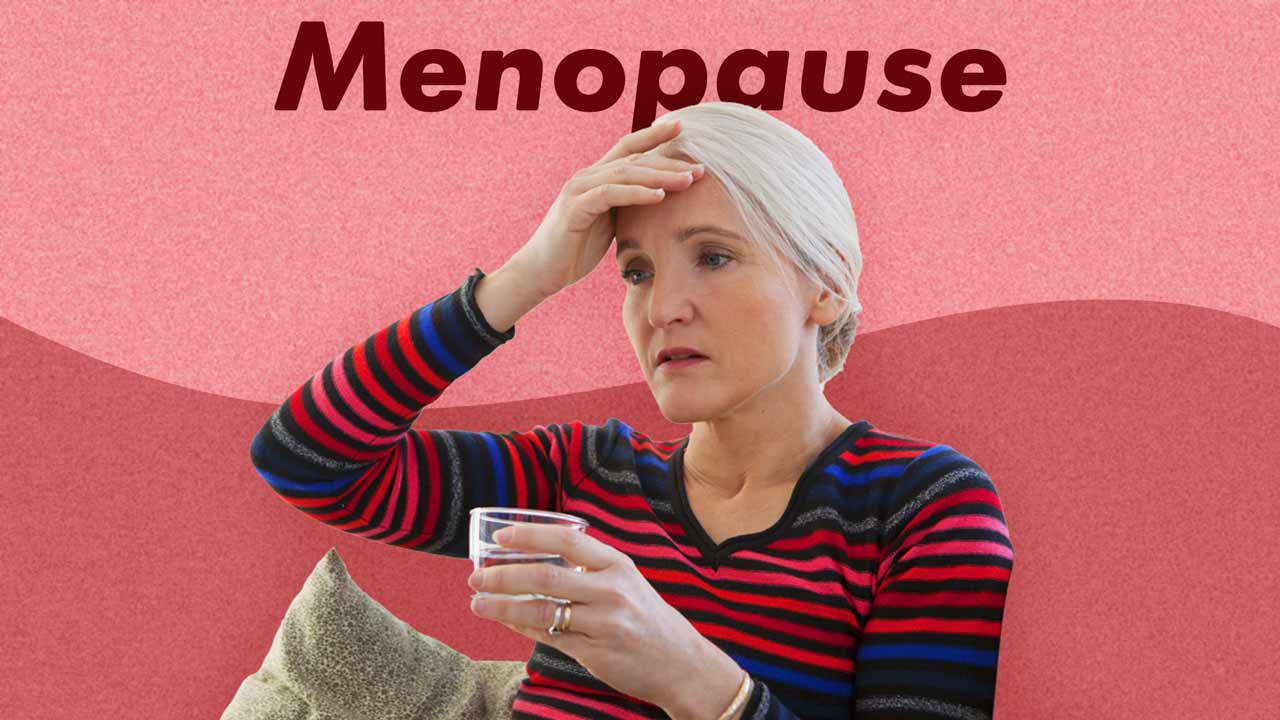What is Menopause?
Menopause marks the permanent end to a person’s menstrual cycle (AMS 2022.)
While menopause is mostly experienced between the ages of 45 and 55 (with an average age of 51 to 52), some people reach menopause earlier or later (Better Health Channel 2023; Jean Hailes 2025a).
- Premature menopause is when menopause occurs before the age of 40
- Early menopause is when menopause occurs before the age of 45
- Late-onset menopause is when menopause occurs after the age of 55.
(Better Health Channel 2023; Faris 2024)
Despite this, there is no set age at which menopause should begin - it depends on the individual (WHO 2024).
A person is considered to be postmenopausal after 12 consecutive months without experiencing a period (AMS 2022).
Why Does Menopause Occur?
Females are born with one million eggs in each ovary. This decreases to 250,000-400,000 by puberty, and after about the age of 37, the number of eggs decreases more rapidly (Owen et al. 2023).
It is thought that menopause is triggered by the ovaries running out of eggs completely, but the cause is not yet completely understood (The Women’s 2019).
Stages of Menopause
There are three stages of menopause:
- Perimenopause: The duration of time between the last few years leading up to the final period and the first year following. As menopause approaches, the ovaries reduce the production of oestrogen and progesterone (the female hormones), and hormone levels fluctuate. As a result, there may be changes in the menstrual cycle such as longer, shorter or irregular cycles, or lighter or heavier bleeding. Fertility is low in these final years, but pregnancy is still possible.
- Natural menopause: The spontaneous, natural ending of menstrual periods (not caused by treatment or surgery), defined by 12 consecutive months without menstrual bleeding.
- Postmenopause: Life following the first year after the final period.
(The Women’s 2019; Better Health Channel 2023)
Menopause Symptoms

Most people will experience a variety of symptoms during the perimenopause and postmenopause phases.
The first symptoms are usually irregular periods, hot flushes and night sweats.
However, it is important to remember that no two people experience menopause in the same way - the specific symptoms experienced and their severity will depend on factors such as culture, health and lifestyle (Peacock et al. 2023).
- 20% experience no symptoms
- 60% experience mild or moderate symptoms
- 20% experience severe symptoms that impair daily functioning.
(Jean Hailes 2023)
Possible symptoms include:
- Vasomotor symptoms (i.e. hot flushes and night sweats), which affect about 80% of people
- Sleep problems due to vasomotor symptoms
- Impaired memory and concentration due to disturbed sleep
- Mood changes, including low mood, depression, tearfulness and irritability, which affect about 10% of people
- Vaginal dryness
- Reduced interest in sex, libido or sexual responsiveness
- Aches and pains
- Headaches or migraines
- Bloating
- Itchy or ‘crawling’ skin
- Fatigue
- Breast pain or tenderness
- Urinary frequency
- Wakefulness.
(The Women’s 2019; Jean Hailes 2025b)
The decrease of female hormones also leads to long-term health risks, including:
- Osteoporosis and consequently, an increased risk of fractures
- Increased risk of cardiovascular disease.
(Peacock et al. 2023)
Vasomotor Symptoms (Hot Flushes and Night Sweats)
Vasomotor symptoms are commonly experienced during menopause. They are usually the most severe in the year around the final menstrual period (The Women’s 2019).
Hot flushes are characterised by a sensation of overheating that usually begins in the chest before spreading up to the head and neck. They can last from a few seconds to a few minutes and may be accompanied by sweating, skin reddening and a racing heartbeat (The Women’s 2019; Jean Hailes 2025b).
Some people may experience one hot flush per day, while others may experience more than 20 (Jean Hailes 2025b). Hot flushes may even continue for many years after menopause (The Women’s 2019).
While the exact cause of vasomotor symptoms is not completely understood, it’s thought that reduced oestrogen levels interfere with the parts of the brain responsible for temperature regulation (Jean Hailes 2025b).

Treatment of Menopause Symptoms
Hormone therapy (menopausal hormone therapy (MHT) or hormone replacement therapy (HRT)) is effective in relieving menopause symptoms such as vasomotor symptoms, mood swings, irritability, insomnia, joint aches and vaginal dryness (Healthdirect 2024a).
MHT/HRT/HT is able to reduce vasomotor symptoms in about 80% of people, as well as reduce osteoporosis (The Women’s 2019).
It can generally be safely taken for up to five years, but may increase the risk of breast cancer if used beyond that time period (The Women’s 2019).
It is not an appropriate treatment for those who have:
- A history of oestrogen-dependent cancer (e.g. breast or uterine cancer)
- Undiagnosed vaginal bleeding
- Cardiovascular disease or stroke
- Unmanaged hypertension
- Blood clots or an increased risk of blood clots
- Liver disease.
(Healthdirect 2024a)
Other treatment options that may help to relieve the symptoms of menopause include:
- Counselling and psychological therapy
- Acupuncture
- Certain non-hormonal medicines to reduce vasomotor symptoms, e.g. antidepressants, gabapentin or clonidine.
(The Women’s 2019)
Lifestyle changes that may relieve symptoms include:
- Maintaining a healthy diet and exercising regularly
- Maintaining mental health
- Avoiding alcohol and spicy foods, which may trigger hot flushes
- Wearing layers of clothing that are easy to remove
- Using fans or air conditioners
- Using stress-management techniques
- Getting good-quality sleep
- Using light-weight sleepwear and bedding
- Smoking cessation.
(Healthdirect 2024b; Better Health Channel 2023; The Women’s 2019)
Early and Premature Menopause
Early menopause affects about 12% of people (Better Health Channel 2024).
Causes of Early Menopause
Potential causes of early menopause include:
- Bilateral oophorectomy (surgical removal of both ovaries) or hysterectomy (surgical removal of the uterus) to treat conditions such as endometriosis or ovarian cancer
- Cytotoxic treatments, including chemotherapy and radiotherapy, which can damage the ovaries
- Primary ovarian insufficiency (POI), which occurs when the ovaries spontaneously stop functioning before the age of 40. This may be caused by:
- Autoimmune conditions e.g. thyroid disease, Crohn’s disease, systemic lupus, type 1 diabetes, coeliac disease
- Genetic conditions such as Turner syndrome and being a carrier of Fragile X syndrome
- Certain metabolic conditions
- Infections, such as mumps.
(OASH 2025; Jean Hailes 2025c; ACI 2024)
About 60% of instances of POI have no known cause (Better Health Channel 2024).
Risk Factors for Early Primary Ovarian Insufficiency
- Family history of early menopause
- Nulliparity
- Hysterectomy
- Living with human immunodeficiency virus (HIV) infection
- Smoking
- Low body weight.
(AMS 2020)
Consequences of Early Menopause
Early menopause can be emotionally distressing for a number of reasons. People may experience feelings such as:
- Grief over no longer being able to have children
- Anxiety about ‘getting old’ too quickly
- Concern that they won’t be seen as sexually attractive by their partner anymore
- Reduced self-esteem
- Confusion
- Mixed emotions about other people’s pregnancies.
(Better Health Channel 2024; AMS 2020)
Early menopause also increases the risk of early-onset osteoporosis and heart disease (Better Health Channel 2024).
Treatment of Early Menopause

While there is no treatment available to make the ovaries function, there is a chance that they will start to work again on their own. In fact, up to 10% of people with POI experience a brief recovery of ovarian function, sometimes even resulting in pregnancy (Kapoor 2023).
In order to reduce the risk of early-onset osteoporosis and heart disease, people experiencing early menopause may be recommended to undergo hormone replacement therapy (HRT) until they reach the average age of menopause (51) (Better Health Channel 2024; AMS 2020).
HRT comes in several forms, including:
- Oestrogen tablets, patches, gels and topical vaginal treatments (used for those who have undergone a hysterectomy)
- Oestrogen plus progesterone (used for those who have not undergone a hysterectomy)
- Combined oestrogen and progestogen oral contraceptive pill.
(Better Health Channel 2024; AMS 2020)
People experiencing early menopause should receive plenty of support from their partner, family and friends, as this can be a distressing time (AMS 2020).
Late-Onset Menopause
People who experience late-onset menopause have increased exposure to female hormones and are therefore more at risk of oestrogen-dependent cancers. Furthermore, increased ovulation heightens the risk of ovarian cancer (Obermair 2020).
Despite this, late-onset menopause is also associated with longer life expectancy, decreased risk of heart disease and stroke, and delayed osteoporosis (meaning their bones are stronger and less prone to fracturing) (Obermair 2020).
The LGBTIQ+ Menopause Experience
Menopause is often talked about as something that only affects women, however, it should be noted that menopause also happens to people of differing genders, including trans men (assigned the female gender at birth) and non-binary people, who identify as neither male nor female (Sutton 2021).
Menopause may trigger feelings of severe unease, known as dysphoria, in people who don’t identify as female, as it may remind them that their reproductive system and physiological experiences don’t align with the gender they identify as. Furthermore, using gendered language when discussing menopause can cause members of the LGBTIQ+ community to feel alienated and possibly avoid seeking medical help altogether (Sutton 2021).
For this reason, it is important to be inclusive in your language and practice (e.g. using people’s correct pronouns such as he/him or they/them and using the word ‘people’ instead of ‘women’) in order to ensure that healthcare for menopause and other areas of reproductive health is accessible for all patients (Sutton 2021).
Test Your Knowledge
Question 1 of 3
Finish the sentence. Menopause at the age of 46 is considered …
Topics
References
- Agency for Clinical Innovation 2024, Premature, Early and Medical Menopause, New South Wales Government, viewed 6 June 2025, https://aci.health.nsw.gov.au/projects/menopause/foundations/premature-early-medical
- Australasian Menopause Society 2020, Menopause Before 40 and Spontaneous Premature Ovarian Insufficiency, AMS, viewed 6 June 2025, https://www.menopause.org.au/images/factsheets/Menopause_before_40_and_spontaneous_POI.pdf
- Australasian Menopause Society 2022, What is Menopause?, AMS, viewed 5 June 2025, https://www.menopause.org.au/hp/information-sheets/185-what-is-menopause
- Better Health Channel 2023, Menopause, Victoria State Government, viewed 5 June 2025, https://www.betterhealth.vic.gov.au/health/conditionsandtreatments/menopause
- Better Health Channel 2024, Premature and Early Menopause, viewed 5 June 2025, https://www.betterhealth.vic.gov.au/health/conditionsandtreatments/premature-and-early-menopause
- Faris, S 2024, ‘Late-Onset Menopause: What Is Causing Your Delay?’, Healthline, 29 March, viewed 5 June 2025, https://www.healthline.com/health/menopause/late-onset
- Healthdirect 2024a, Hormone Replacement Therapy (HRT), Australian Government, viewed 6 June 2025, https://www.healthdirect.gov.au/hormone-replacement-therapy
- Healthdirect 2024b, Managing Menopausal Symptoms Without Medication, Australian Government, viewed 6 June 2025, https://www.healthdirect.gov.au/managing-menopausal-symptoms-without-medication
- Jean Hailes 2023, Perimenopause, Jean Hailes Foundation, viewed 6 June 2025, https://www.jeanhailes.org.au/resources/perimenopause-fact-sheet
- Jean Hailes 2025a, What is Menopause?, Jean Hailes Foundation, viewed 5 June 2025, https://www.jeanhailes.org.au/health-a-z/menopause/about-menopause
- Jean Hailes 2025b, Symptoms of Menopause, Jean Hailes Foundation, viewed 6 June 2025, https://www.jeanhailes.org.au/health-a-z/menopause/menopause-symptoms
- Jean Hailes 2025c, Symptoms of Premature and Early Menopause, Jean Hailes Foundation, viewed 6 June 2025, https://www.jeanhailes.org.au/health-a-z/menopause/premature-early-menopause
- Kapoor, E 2023, ‘Premature Ovarian Insufficiency’, Current Opinion in Endocrine and Metabolic Research, vol. 28, viewed 6 June 2025, https://www.sciencedirect.com/science/article/abs/pii/S2451965023000029?via%3Dihub
- Obermair, A 2020, ‘How Does Age at Menopause Affect Disease and Cancer Risk?’, Prof Andreas Obermair, 25 May, viewed 6 June 2025, https://www.obermair.info/latest-news/blog/how-does-age-at-menopause-affect-disease-and-cancer-risk/
- Office on Women’s Health 2025, Early or Premature Menopause, U.S. Department of Health & Human Services, viewed 6 June 2025, https://womenshealth.gov/menopause/early-or-premature-menopause
- Owen, A, Carlson, K & Sparzak, PB 2024, ‘Age-Related Fertility Decline’, StatPearls, viewed 5 June 2025, https://www.ncbi.nlm.nih.gov/books/NBK576440/
- Peacock, K, Carlson, K & Ketvertis, KM 2023, ‘Menopause’, StatPearls, viewed 6 June 2025, https://www.ncbi.nlm.nih.gov/books/NBK507826/
- Sutton, M 2021, ‘We Need to Talk About the LGBTQ+ Menopause Experience’, Good Housekeeping, 16 February, viewed 6 June 2025, https://www.goodhousekeeping.com/uk/health/a35227597/lgbtq-menopause-experience/
- The Women’s 2019, Menopause, The Royal Women’s Hospital, viewed 6 June 2025, https://www.thewomens.org.au/health-information/menopause-information/
- World Health Organisation 2024, Menopause, WHO, viewed 5 June 2025, https://www.who.int/news-room/fact-sheets/detail/menopause
 New
New 
